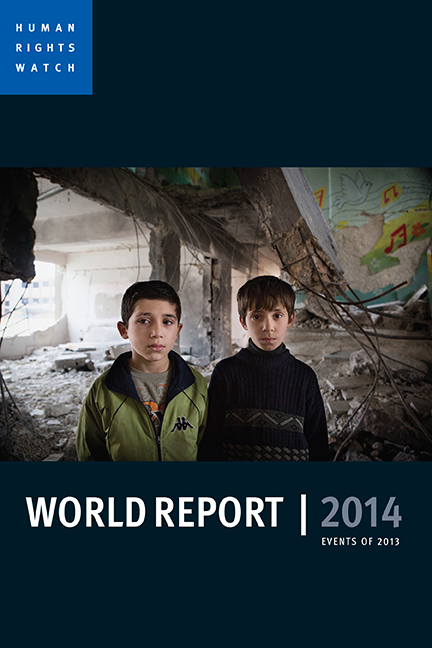Book contents
- Frontmatter
- Dedication
- HUMAN RIGHTS WATCH
- Table of Contents
- Foreword
- Rights Struggles of 2013: Stopping Mass Atrocities, Majority Bullying, and Abusive Counterterrorism
- The Human Rights Case for Drug Reform How Drug Criminalization Destroys Lives, Feeds Abuses, and Subverts the Rule of Law
- Putting Development to Rights: Integrating Rights into a Post-2015 Agenda
- The Right Whose Time Has Come (Again) Privacy in the Age of Surveillance
- Photo Essays
- AFRICA
- AMERICAS
- ASIA
- EUROPE AND CENTRAL ASIA
- MIDDLE EAST AND NORTH AFRICA
- UNITED STATES AND CANADA
- 2013 HUMAN RIGHTS WATCH PUBLICATIONS
- Acknowledgments
- Frontmatter
- Dedication
- HUMAN RIGHTS WATCH
- Table of Contents
- Foreword
- Rights Struggles of 2013: Stopping Mass Atrocities, Majority Bullying, and Abusive Counterterrorism
- The Human Rights Case for Drug Reform How Drug Criminalization Destroys Lives, Feeds Abuses, and Subverts the Rule of Law
- Putting Development to Rights: Integrating Rights into a Post-2015 Agenda
- The Right Whose Time Has Come (Again) Privacy in the Age of Surveillance
- Photo Essays
- AFRICA
- AMERICAS
- ASIA
- EUROPE AND CENTRAL ASIA
- MIDDLE EAST AND NORTH AFRICA
- UNITED STATES AND CANADA
- 2013 HUMAN RIGHTS WATCH PUBLICATIONS
- Acknowledgments
Summary
Rwanda adopted a number of new laws, including media laws and a revised law on genocide ideology. The country continued to make impressive progress in the delivery of public services, such as health care, but freedom of expression and association remain tightly controlled. The government obstructed opposition parties and independent civil society organizations, and threatened its critics. Parliamentary elections resulted in an overwhelming majority for the ruling party, with no meaningful challenge. The leadership of one of the last remaining independent human rights organizations was taken over by pro-government elements.
Despite mounting international concern, Rwanda provided significant military support to the M23, an armed group responsible for serious abuses against civilians in eastern Democratic Republic of Congo. In November, the M23 was defeated by the Congolese army and UN peacekeepers, after Rwanda appeared to withdraw its support for the M23 during military operations.
Political Parties
The ruling Rwandan Patriotic Front (RPF) won parliamentary elections in September with more than 76 percent of the vote. The only other parties that presented candidates were those broadly supporting the RPF.
The opposition Democratic Green Party of Rwanda, which had been trying to register as a party for almost four years, was finally granted registration by the government in August, on the day before the deadline for parties to submit their lists of election candidates. As a result, it decided not to take part in the polls.
Two opposition party leaders arrested in 2010—Victoire Ingabire of the FDU-Inkingi and Bernard Ntaganda of the PS-Imberakuri—remained in prison, serving sentences of respectively eight and four years, Ntaganda for endangering national security and divisionism, and Ingabire for conspiracy to undermine the government and genocide denial. Appeal hearings for Ingabire, who was sentenced in 2012, concluded at the High Court in Kigali on July 31. The judgment is expected in December.
Sylvain Sibomana, secretary general of the FDU-Inkingi, and Dominique Shyirambere, another party member, were arrested on March 25, after a confrontation with police outside the courtroom where Ingabire's trial was taking place. They were charged with contempt of public officials, illegal demonstration, and inciting insurrection or public disorder.
- Type
- Chapter
- Information
- World Report 2014Events of 2013, pp. 154 - 159Publisher: Bristol University PressPrint publication year: 2014



